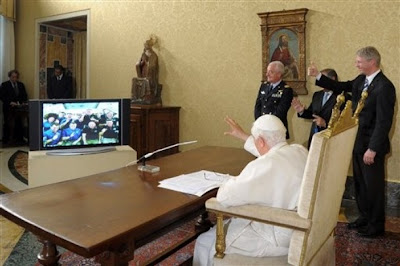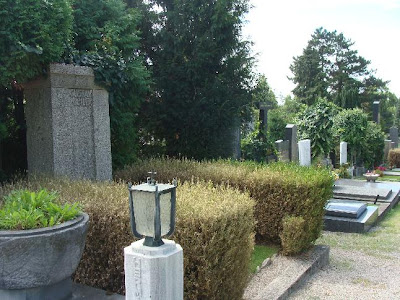I'll begin this post with two disclaimers: First, this is not the post I intended to publish today; I gave some thought over the weekend to composing a post on the beatification of Pope John Paul II, but once
I heard this news last Sunday night I knew that wasn't going to happen. Second, the post I actually did write - the one you're reading - has evolved considerably since I began work on it yesterday afternoon. My original intent was to focus solely on
Realpolitik; since I spent most of my pre-Jesuit life thinking about politics, it should surprise no one that I can't help but think about events like this in political terms. Though politics remains the point of departure for this post, I found myself inevitably getting somewhat personal as I wrote and I decided that some of the personal stuff would have to stay in.
Whatever happens next in the War on Terror, the symbolic impact of Osama bin Laden's death is undeniable. Viewing photographs and video of the crowds that gathered late last night outside the White House, at Ground Zero, and at other locations throughout the United States, one can see the tremendous emotional impact that this news has had on a nation that is still suffering from the trauma of 9/11. Al-Qaeda's targets and victims have never been limited to any one country or national group, so I expect that strong emotional reactions to Bin Laden's death will be expressed throughout the world.
Looking towards the 2012 presidential election in the United States, it must be said that the successful strike against Bin Laden will make it much harder for any Republican challenger to credibly fault President Obama's record on national security issues. For better or worse, many future debates on the President's job performance (among pundits and ordinary citizens alike) will end with this rebuttal: "Yeah, but he got Bin Laden."
What does Bin Laden's death mean in Middle East and other regions where Islam plays a significant role in politics? Writing for
Foreign Policy,
George Washington University political scientist Marc Lynch argued yesterday that "al-Qaeda had
already been effectively marginalized within the mainstream of the Arab world long before bin Laden died." Thanks to a link shared by a friend in New York, I also had the opportunity yesterday to read some thoughts on
"What Bin Laden's death means to Muslims" from Dubai-based blogger Iyad el-Baghdadi:
To a Muslim, assessing the life of a man like Bin Laden is difficult. There are two Bin Ladens that we knew. The first was a devout Muslim who called for resistance against occupation. The second was a terrorist who called for violence against innocent people based on flimsy and contrived scriptural evidence.
People in the West (the U.S. in particular) may think that Bin Laden and al-Qaeda was all about them, but it wasn't. The organization he founded and headed, as well as the greater ideological movement to which he belonged, was yet another attempt by the Muslim world to get out of a rut. Some Muslims saw an answer in playing the political game; others in education and propagation. Yet others saw it in violence.
Much will be said and written, and most will be irrelevant. Because Bin Laden was made irrelevant in December 2010, when Muslim people discovered that they can achieve regime change through peaceful means, contradicting al-Qaeda's message that violence was the only solution.
People in the U.S. will celebrate, and people in the Muslim world will celebrate for very different reasons. Bin Laden's death just confirms that our world, the Islamic world, has entered a new phase in its history. New convictions are rising and getting confirmed, as old ones and their propagators are disappearing.
Speaking of celebrations in the United States,
a lively debate has been going on regarding this topic over at
Vox Populi, the blog of the
Georgetown Voice. The crowd of thousands that gathered outside the White House in the early hours of Monday included many undergrads from my alma mater, leading one
Vox Populi commenter to fault the Georgetown students who went to the White House for showing "a disgusting nationalist, jingoistic bloodlust I hoped to never see [come] out of my fellows Hoyas." This accusation of "jingoistic bloodlust" (typical Hoya rhetoric, by the way) unsurprisingly generated a lot of argument about whether or not the celebratory spirit of the gathering was appropriate. Here's how one participant responded:
I was also there, and the crowd was clearly not made up of just conservatives or military-hardliner types, and was not just college students. I think this was about many Americans very eager for something to celebrate in a time where things have looked so bleak lately with 2.5 wars and a still-awful economy.
For most I don’t think this was about bloodlust and celebrating death; it was about finally (if only symbolically) closing a chapter of the War on Terror that’s spanned basically all of our politically conscious lives.
The last line about how the War on Terror has "spanned basically all of our politically conscious lives" confirms the generation gap that already exists between my own cohort and today's university students. I graduated from Georgetown in May of 2001 and was a first-year law student at Notre Dame when the 9/11 attacks took place; at the same time, the above commenter and his contemporaries (including the students I now teach at SJU) were all in elementary school. You'll have to ask me what I think about this later on, as I'm still trying to decide what to make of it.
Of all the comments on the
Vox Populi post referenced above, this one gave me the most to think and to pray about:
I’m from New Jersey. My best friend’s dad - a man who was basically my second father - died in the Twin Towers. To see how a family was destroyed after the attacks - via drug addiction, dropping out of school, and becoming utterly dysfunctional - was absolutely heartbreaking. The family that exists today isn’t even a replica of what existed ten years ago. And this isn’t a one-family situation - many people I’ve talked to from the New York/New Jersey area have seen very similar situations occur.
A few of my family members in the FDNY volunteered and helped that day. They risked their lives to help others without a second thought about what may happen to them or what may happen to their family members if they happened to pass away.
I went to the White House last night. I wasn’t celebrating Osama bin Laden’s demise. I was celebrating America.
Bin Laden’s death was symbolic for many reasons. For me, and for a lot of other people celebrating last night, it was a symbol that America cares. Ten years later, America is still trying to do whatever it can to make sure what happened to my friend’s family - and many families across America - never happens again.
I was celebrating that my government cares not only about politics and the nation, but about each citizen, each community, and each family. That’s a heck of a reason to celebrate.
What can I say to the above? What
should I say to the above? I really don't know. At the very least, I cannot presume to pass judgment on those for whom the pain and trauma of 9/11 is still very raw.
What I can really do? I can recall
my own 9/11 experience. I can remember to pray for the lives that were lost and for God's mercy upon those who brought about their deaths, but I can't pretend that this is an adequate response to the losses that the survivors and families of the victims have suffered.
Someday I hope that I'll be able to offer a better response to all this than the one I've offered above. In the meantime, though, I suspect that nothing I can offer is better than silence.


























